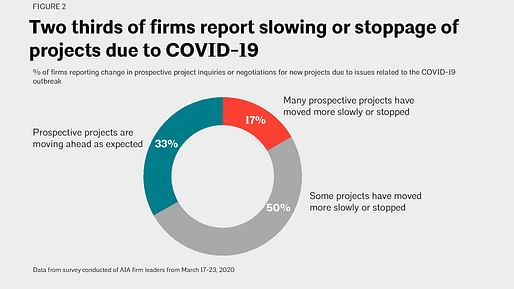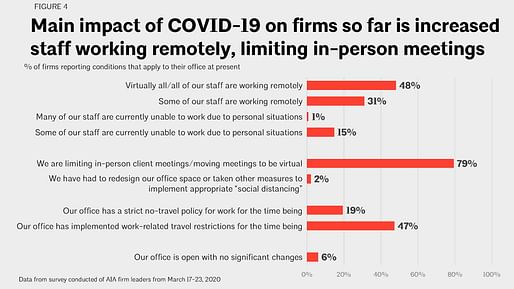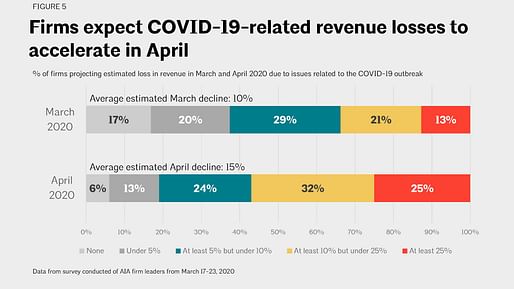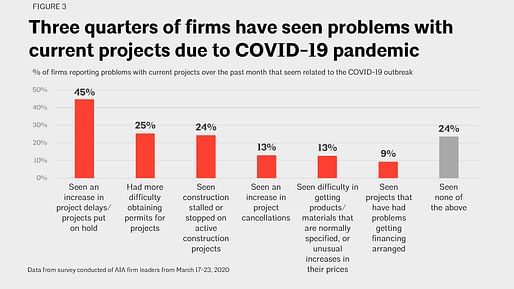
A new report from the American Institute of Architects (AIA) indicates that the COVID-19 crisis has not only thoroughly impacted the day-to-day functions of the architecture industry, but that it has also imperiled its short-term economic future.
Between March 17 and 24, AIA collected survey responses from 387 architecture firms in order to assess the potential short-term impacts of the COVID-19 crisis. According to survey, 50% and 59% of firms have seen design contracts and new project inquiries decrease, respectively, in recent weeks, a figure that sharply counters the relatively upbeat Architecture Billings Index (ABI) report documenting February's business activities that AIA published just as the crisis was taking root mid-March.
Not only that, but the AIA study also finds that two thirds of American architecture firms report at least some slowing or stoppage of projects due to COVID-19, with 17% of the total indicating that “many prospective projects have moved more slowly or stopped.”

49% of firms indicated that they have had construction delays or have seen projects put on hold officially, with a significant number of firms—25%—indicating that they have had trouble pulling permits for construction work to begin, as municipal offices shut down or sharply curtail operating hours in response to the crisis. Meanwhile, 13% of firms have seen difficulty in getting products and other construction materials that are normally specified to their project sites. Distressingly, 13% of firms have seen an increase in outright project cancellations, while 9% have cited new difficulty finding financing as a reason for project slowdowns.

As segments of society have shut down or moved to remote work in response to the crisis, 47% of architecture firms surveyed indicated that “virtually all / all of our staff are working remotely,” while 31% stated that just “some” of the firm’s workforce had shifted to WFH. 15% of firms indicated that some portion of its workforce was “currently unable to work due to personal situations,” with only 1% indicating that “many” staff members had been take out of commission by the crisis.
Only 6% of firms indicated that work had continued undisturbed as before.
A whopping 79% of firms responded that they have moved to limit client interactions through digital conferencing means. 66% of firms have limited travel at least somewhat since the onset of the crisis with 19% setting up strict no-travel policies.

In terms of revenue, 17% of firms responded that they expected no change due to the crisis, while 63% indicated that they expected to see more than a 5% drop in revenue for the month of March. Of those, 13% state that they expect to see a loss of revenue of “at least 25%.”
The predictions for the month of April are more dire.
Only 6% anticipate no change in revenue due to the crisis in April, while 32% indicate a decrease between 10% and 25%. A quarter of the architecture firms surveyed expect to see a fall in revenue greater than 25% for the month.
These findings come as major financial institutions, including banking giant Goldman Sachs, anticipate a "sharp recession" playing out over the next three to six months in Europe and the US that could improve incrementally if the spread of the virus is halted effectively. Even under the best case scenario currently envisioned, however, Goldman Sachs projects that the American economy will contract by 3.8% for the year. Previously economists had projected growth of roughly 2.2% for 2020.

The survey, it should be noted, was conducted before the United States federal government successfully passed the CAREs Act, a roughly $2 trillion economic rescue package that, among other things, brings $377 billion in emergency loans to help businesses that employ fewer than 500 people keep up with salaries, overhead, and other necessary expenses through the duration of the crisis. The necessary package is targeted toward helping keep workers on staff and paid, but firms could see their troubles multiply as the crisis deepens. As the respondents above indicated, many firms anticipate larger issues beyond meeting payroll on the horizon, as a growing number of project cancellations and difficulty in acquiring financing despite extremely favorable monetary policies portend cascading economic impacts on the horizon, potentially.
The impact of the relief package on architecture firms and their employees is yet to be seen, but the AIA recently lauded the effort.
In a press release celebrating the passage of the CAREs Act, 2020 President Jane Frederick, FAIA said, "We’re pleased that all of these vital businesses are rightfully recognized as a priority. Architects will be a critical part of economic recovery, and AIA has forcefully advocated for infrastructure investment to stimulate recovery, as well as relief for businesses and employees. This relief package is a good start, and AIA continues to work with policymakers to ensure our members’ priorities are included in additional legislation as we continue to address this crisis.”
2 Comments
Why are these news items so far out of date?
You are commenting on a news article published over 4 years ago, on Mar 31, '20
Block this user
Are you sure you want to block this user and hide all related comments throughout the site?
Archinect
This is your first comment on Archinect. Your comment will be visible once approved.